|
|
|
Sort Order |
|
|
|
Items / Page
|
|
|
|
|
|
|
| Srl | Item |
| 1 |
ID:
123229
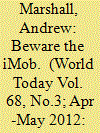

|
|
|
| 2 |
ID:
162862
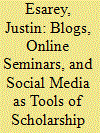

|
|
|
|
|
| Summary/Abstract |
How do political scientists use online tools as part of their scholarly work? Are there systematic differences in how they value these tools by field, gender, or other demographics? How important are these tools relative to traditional practices of political scientists? The answers to these questions will shape how our discipline chooses to reward academics who engage with “new media” such as blogs, online seminars (i.e., webinars), Twitter, and Facebook. We find that traditional tools of scholarship are more highly regarded and used more often than any new media, although blogs are considered most important among new media. However, we also find evidence that these webinars are used and valued at rates comparable to traditional tools when they are provided in ways that meet political scientists’ needs. Finally, we observe that women and graduate students are substantially more likely than men and tenure-track academics to report that webinars and online videos are important sources of new ideas and findings.
|
|
|
|
|
|
|
|
|
|
|
|
|
|
|
|
| 3 |
ID:
146577
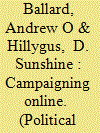

|
|
|
|
|
| Summary/Abstract |
Although much of what we know about political advertising comes from the study of television advertising alone, online advertising is an increasingly prominent part of political campaigning. Research on other online political communication—especially candidate websites, blogs, and social media—tends to conclude that these communications are aimed primarily at turning existing supporters into campaign donors, activists, and volunteers. Is a similar communication strategy found in online display ads—those ads placed adjacent to website content? In one of the first systematic analyses of the nature, content, and targets of online display advertising, we examined 840 unique online display ads from the 2012 presidential campaign. We show that the policy content, ad location, and interactive elements of the ads varied based on the audience, with persuasive appeals aimed at undecided or persuadable voters and engagement appeals aimed at existing supporters. Comparing ad content across candidates also found that each side focused on those issues for which the candidate had a strategic advantage. As a consequence, and in contrast to the conclusions of previous research that examines television advertising, we found minimal issue engagement in online advertising.
|
|
|
|
|
|
|
|
|
|
|
|
|
|
|
|
| 4 |
ID:
089333
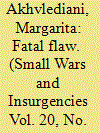

|
|
|
|
|
| Publication |
2009.
|
| Summary/Abstract |
This paper examines the role of the media during and after the August invasion of Georgia by Russian troops. It shows how on both sides the media responded to strong pressures to report the conflict from a very one-sided perspective. Indeed the conflict can be seen as a media as much as a military conflict as both sides struggled to present themselves in the best possible light before the international community and to exaggerate the losses that had been inflicted on their own rather then their enemy's forces. The article details the way this conflict was played out in printed media and TV as well as Internet blogs and provides information on the cyber war, which also broke out between the rival states.
|
|
|
|
|
|
|
|
|
|
|
|
|
|
|
|
| 5 |
ID:
126696
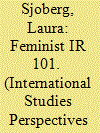

|
|
|
|
|
| Publication |
2013.
|
| Summary/Abstract |
This article discusses the pedagogical potential of a series of blog posts called "Feminist IR 101," which I wrote and posted on Duck of Minerva (duckofminerva.blogspot.com) over the course of 2010 and 2011. As our students increasingly rely on the internet as a source of not only news but knowledge and opinions, this group of posts looks to reach our student audience (and perhaps even others in the discipline) differently than textbooks or other traditional materials. They were meant to be an introduction to feminist IR in the true sense of the word-what feminist IR is, the vocabulary it uses, how it is useful in analysis, and why it is meaningful to scholars and students of gender and global politics. Their goal is to account for both what a feminist perspective contributes to the study of global politics and why I chose to do my research from that perspective. This short article looks specifically at both the "Feminist IR 101" project and its potential classroom uses, as well as the pedagogical value of blogging feminist IR more generally.
|
|
|
|
|
|
|
|
|
|
|
|
|
|
|
|
| 6 |
ID:
132091
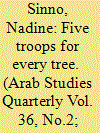

|
|
|
| 7 |
ID:
097844
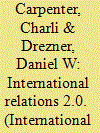

|
|
|
|
|
| Publication |
2010.
|
| Summary/Abstract |
The International Relations (IR) profession has not fully taken stock of the way in which user-driven information technologies-including Blogger, Facebook, Twitter, YouTube, and Wikipedia-are reshaping our professional activities, our subject matter, and even the constitutive rules of the discipline itself. In this study, we reflect on the ways in which our own roles and identities as IR scholars have evolved since the advent of "Web 2.0": the second revolution in communications technology that redefined the relationship between producers and consumers of online information. We focus on two types of new media particularly relevant to the practice and the profession of IR: blogs and social networking sites.
|
|
|
|
|
|
|
|
|
|
|
|
|
|
|
|
| 8 |
ID:
160964
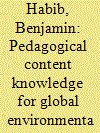

|
|
|
|
|
| Summary/Abstract |
Pedagogical design in international relations and environmental politics needs to help students become active participants in the sustainability transition. This article documents the use of a blog-based assessment activity in an international relations undergraduate course Global Environmental Politics. The activity has a multifunctional design that draws on different forms of pedagogical content knowledge to enhance student learning. These include metacognitive skill development in relation to environmental politics, cultivation of professional networks in the environment and sustainability field, and methods of active participation in the politics of the sustainability transition. Blog-based representations of pedagogical content knowledge can be replicated across international relations curricula.
|
|
|
|
|
|
|
|
|
|
|
|
|
|
|
|
| 9 |
ID:
106309
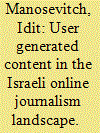

|
|
|
|
|
| Publication |
2011.
|
| Summary/Abstract |
The paper provides a review of research on user generated content in the Israeli online journalism landscape. Findings reveal that scholarly attention has been focused primarily on user comments, with initial insight on the role of blogs and citizen journalism in the Israeli journalism landscape. Methodologically, research is derived primarily from interviews with newsroom staff and case study content analyses. The review suggests that future research should complement current data with user based inquiry about orientations and use of UGC, and examine the role of Israeli culture in the practice of UGC.
|
|
|
|
|
|
|
|
|
|
|
|
|
|
|
|
|
|
|
|
|